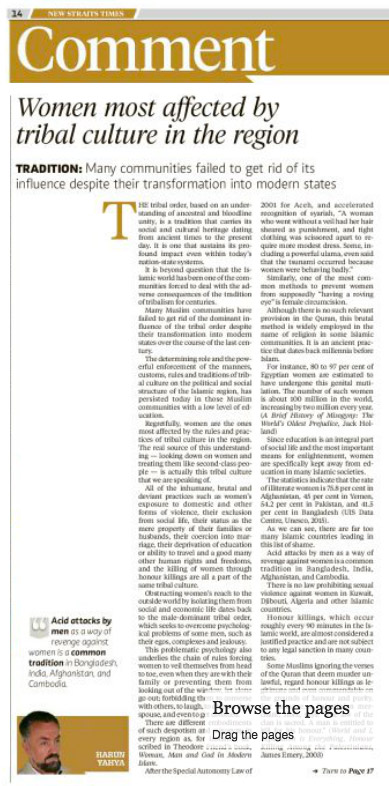 The tribal order, based on an understanding of ancestral and bloodline unity, is a tradition that carries its social and cultural heritage dating from ancient times to the present day. It is one that sustains its profound impact even within today’s nation-state systems.
The tribal order, based on an understanding of ancestral and bloodline unity, is a tradition that carries its social and cultural heritage dating from ancient times to the present day. It is one that sustains its profound impact even within today’s nation-state systems.
It is beyond question that the Islamic world has been one of the communities forced to deal with the adverse consequences of the tradition of tribalism for centuries.
Many Muslim communities have failed to get rid of the dominant influence of the tribal order despite their transformation into modern states over the course of the last century.
The determining role and the powerful enforcement of the manners, customs, rules and traditions of tribal culture on the political and social structure of the Islamic region, has persisted today in those Muslim communities with a low level of education.
Regretfully, women are the ones most affected by the rules and practices of tribal culture in the region. The real source of this understanding — looking down on women and treating them like second-class people — is actually this tribal culture that we are speaking of.
All of the inhumane, brutal and deviant practices such as women’s exposure to domestic and other forms of violence, their exclusion from social life, their status as the mere property of their families or husbands, their coercion into marriage, their deprivation of education or ability to travel and a good many other human rights and freedoms, and the killing of women through honour killings are all a part of the same tribal culture.
Obstructing women’s reach to the outside world by isolating them from social and economic life dates back to the male-dominant tribal order, which seeks to overcome psychological problems of some men, such as their egos, complexes and jealousy.
This problematic psychology also underlies the chain of rules forcing women to veil themselves from head to toe, even when they are with their family or preventing them from looking out of the window, let alone go out; forbidding them to converse with others, to laugh, to dispute their spouse, and even to get divorced.
There are different embodiments of such despotism and misogyny in every region as, for instance, described in Theodore Friend’s book, Woman, Man and God in Modern Islam.
After the Special Autonomy Law of 2001 for Aceh, and accelerated recognition of syariah, “A woman who went without a veil had her hair sheared as punishment, and tight clothing was scissored apart to require more modest dress. Some, including a powerful ulama, even said that the tsunami occurred because women were behaving badly.”
Similarly, one of the most common methods to prevent women from supposedly “having a roving eye” is female circumcision.
Although there is no such relevant provision in the Quran, this brutal method is widely employed in the name of religion in some Islamic communities. It is an ancient practice that dates back millennia before Islam.
For instance, 80 to 97 per cent of Egyptian women are estimated to have undergone this genital mutilation. The number of such women is about 100 million in the world, increasing by two million every year. (A Brief History of Misogyny: The World’s Oldest Prejudice, Jack Holland)
Since education is an integral part of social life and the most important means for enlightenment, women are specifically kept away from education in many Islamic societies.
The statistics indicate that the rate of illiterate women is 75.8 per cent in Afghanistan, 45 per cent in Yemen, 54.2 per cent in Pakistan, and 41.5 per cent in Bangladesh (UIS Data Centre, Unesco, 2015).
As we can see, there are far too many Islamic countries leading in this list of shame.
Acid attacks by men as a way of revenge against women is a common tradition in Bangladesh, India, Afghanistan, and Cambodia.
There is no law prohibiting sexual violence against women in Kuwait, Djibouti, Algeria and other Islamic countries.
Honour killings, which occur roughly every 90 minutes in the Islamic world, are almost considered a justified practice and are not subject to any legal sanction in many countries.
Some Muslims ignoring the verses of the Quran that deem murder unlawful, regard honour killings as legitimate and even commendable on the grounds of honour and purity. For instance, a Palestinian merchant, Jibril, says: “The law of the clan is sacred. A man is entitled to kill for his honour.” (World and I, Reputation is Everything, Honour Killing Among the Palestinians, James Emery, 2003)
A great part of the more than 1,000 honour killings that take place every year are covered up and go unpunished in Pakistan, one of the countries where these honour killings are the most common today and are almost considered as legal due to such a deviant understanding.
This ostracisation of women to such an extent in the tribal culture, brings about a “men’s only” social life and abominations that sometimes lead to sexual perversions.
The fact is, however, that Islam condemned and prohibited the aforementioned traditions 14 centuries ago. Islam forbids such deviance.
Nowadays, a large mass of those who believe “they are living by the religion of Islam” are being deceived to protect this primitive culture.
Muslims must return to the Quran to get rid of this brutal, dark, primitive and rigidly discriminatory culture.
0 comments:
Post a Comment